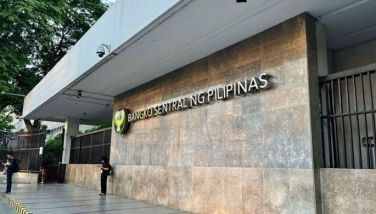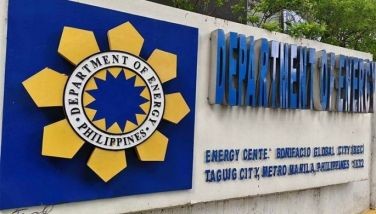Plotting the biotech roadmap

August 18, 2006 | 12:00am
The Philippines has the potential to make it in the big leagues of biotechnology. In recent years, biotech development in the country, especially in agriculture, has taken quite significant strides.
In fact, a number of "Pinoy Biotek" products will be commercialized in the next three to five years, among them the cloned "Super Buffalo" which is bigger in size and produces more milk than the native carabao; a ringspot virus-resistant papaya which is being widely anticipated by the cosmetics sector as well as fresh papaya exporters; a multi-virus resistant tomato variety; a bunchy top-resistant abaca; vitamin-fortified rice and rice that uses less water; a cadang-cadang-resistant coconut; and a fruit and shoot borer-resistant Bt eggplant.
In the area of bio-pharming wherein plants are genetically engineered to produce pharmaceutical proteins and chemicals, one product that has commercial potential is the edible vaccine being developed by Dr. Nina Gloriani Barzaga, of the College of Public Health of the University of the Philippines.
With the country’s rich biodiversity, local agriculture is increasingly turning to agricultural biotech to modernize food production and diversify product outputs. On the other hand, the rapid growth of global biotech enterprises is encouraging the country to secure a niche in bio-commerce.
The market for biotechnology is estimated at $15 billion for the energy sector, the biotech food market as high as $12 billion, chemicals at $10 billion, health care at $8.5 billion, agriculture at $8 billion, metal recovery at $4 billion, and pollution control at $400 million.
There are already success stories that are encouraging and are worth replicating. Altermed Corporation, a Pascual Laboratories subsidiary, aims to carve a niche in the global biopharm industry, and will begin exporting indigenous herbal medicines in 2007.
Secura Plant Genetics Inc., a local manufacturer of agri-biotech products is venturing into the export market for the first time after sealing a P95-million contract to supply the papain extract requirements of Belgian firm Enzybel International SA, a global leader in proteolytic enzymes manufacturing.
Secura is also set to diversify into high-end, plant-based pharmaceuticals production, particularly monoclonal antibodies (MAb), possibly under a joint venture with a US-based firm for the production of a MAb derived from the tobacco plant. One of the country’s respected names in biotechnology, Dr. Saturnina Halos, is being wooed by several companies in Southeast Asia for the distribution of her Vital N biofertilizer.
Given its potentials, the Department of Agriculture recently disclosed a 10-year roadmap for biotechnology. Hopefully, all of the good intentions will bear fruit and not fall into the wayside like so many other ambitious growth strategies for agriculture sub-sectors.
The biotech roadmap will focus on targeting the world market for natural ingredients, and creating a natural ingredient cluster of industries while improving the competitiveness of traditional Philippine agri-fisheries products. The idea is for the DA to develop and promote a cluster of new industries to be composed of the manufacturing and the farming sector for the production of plants yielding medicinal, cosmetic or food ingredients; and agri-bio inputs with sub-sectors on organic fertilizers, bio-fertilizers and bio-pesticides. Along with this, the DA will provide support in terms of policy, credit, technology, and market entry. Eight strategies will be carried out to raise farmers‚ income, improve competitiveness, and ensure sustainable and increased productivity, all anchored on supporting and promoting the natural ingredients industry and promoting integrated multi-product processing of traditional crops.
An all too important ingredient is capital. Special credit facilities will be created in coordination with concerned government agencies and government financing institutions such as the Land Bank of the Philippines (LBP) and the Development Bank of the Philippines (DBP) and will be made available to project proponents. Credit facilities, while useful, may not be enough to finance development of projects. New money from investors and venture capitalists are needed to come in. And they will be looking for a stable and predictable environment before they put their money into any project. Thus, the government must review existing policies and regulatory framework since it will spell the difference whether these inventors are in or not. Already, there are several legislations that are rather limiting or have adopted a short-sighted view in developing this particular sector. For instance, current rules in the area of bio-prospecting or research, collection and use of biological and genetic resources for purposes of commercialization are apparently discouraging prospective investors.
Biodiversity laws such as the "Guidelines for Bioprospecting Activities in the Philippines," a joint administrative order (AO) issued in 2005 by the Department of Environment and Natural Resources, Department of Agriculture, Philippine Council for Sustainable Development and the National Commission on Indigenous Peoples, can be a real turn off.
There is a provision, for example, that requires investors to fork out at least $100,000 yearly while still awaiting approval and issuance of patents for their newly developed products.
In this case, investors can just look for other friendlier shores, or worse, go around the law and steal the country’s resources. Again, we would be shooting ourselves in the foot because such prohibitive expenses will make our biotech products more expensive. If the bigger aim is carving a niche in the global bio-enterprise arena, going for hefty upfront money and restraining venture capitalists from earning good returns surely is not the way to do it.
In fact, a number of "Pinoy Biotek" products will be commercialized in the next three to five years, among them the cloned "Super Buffalo" which is bigger in size and produces more milk than the native carabao; a ringspot virus-resistant papaya which is being widely anticipated by the cosmetics sector as well as fresh papaya exporters; a multi-virus resistant tomato variety; a bunchy top-resistant abaca; vitamin-fortified rice and rice that uses less water; a cadang-cadang-resistant coconut; and a fruit and shoot borer-resistant Bt eggplant.
In the area of bio-pharming wherein plants are genetically engineered to produce pharmaceutical proteins and chemicals, one product that has commercial potential is the edible vaccine being developed by Dr. Nina Gloriani Barzaga, of the College of Public Health of the University of the Philippines.
With the country’s rich biodiversity, local agriculture is increasingly turning to agricultural biotech to modernize food production and diversify product outputs. On the other hand, the rapid growth of global biotech enterprises is encouraging the country to secure a niche in bio-commerce.
The market for biotechnology is estimated at $15 billion for the energy sector, the biotech food market as high as $12 billion, chemicals at $10 billion, health care at $8.5 billion, agriculture at $8 billion, metal recovery at $4 billion, and pollution control at $400 million.
Secura Plant Genetics Inc., a local manufacturer of agri-biotech products is venturing into the export market for the first time after sealing a P95-million contract to supply the papain extract requirements of Belgian firm Enzybel International SA, a global leader in proteolytic enzymes manufacturing.
Secura is also set to diversify into high-end, plant-based pharmaceuticals production, particularly monoclonal antibodies (MAb), possibly under a joint venture with a US-based firm for the production of a MAb derived from the tobacco plant. One of the country’s respected names in biotechnology, Dr. Saturnina Halos, is being wooed by several companies in Southeast Asia for the distribution of her Vital N biofertilizer.
The biotech roadmap will focus on targeting the world market for natural ingredients, and creating a natural ingredient cluster of industries while improving the competitiveness of traditional Philippine agri-fisheries products. The idea is for the DA to develop and promote a cluster of new industries to be composed of the manufacturing and the farming sector for the production of plants yielding medicinal, cosmetic or food ingredients; and agri-bio inputs with sub-sectors on organic fertilizers, bio-fertilizers and bio-pesticides. Along with this, the DA will provide support in terms of policy, credit, technology, and market entry. Eight strategies will be carried out to raise farmers‚ income, improve competitiveness, and ensure sustainable and increased productivity, all anchored on supporting and promoting the natural ingredients industry and promoting integrated multi-product processing of traditional crops.
There is a provision, for example, that requires investors to fork out at least $100,000 yearly while still awaiting approval and issuance of patents for their newly developed products.
In this case, investors can just look for other friendlier shores, or worse, go around the law and steal the country’s resources. Again, we would be shooting ourselves in the foot because such prohibitive expenses will make our biotech products more expensive. If the bigger aim is carving a niche in the global bio-enterprise arena, going for hefty upfront money and restraining venture capitalists from earning good returns surely is not the way to do it.
It is also important for our policymakers to establish a well-defined mechanism on how significant technology discoveries are to be commercialized. Currently, there are no clear rules for technology transfer. As it is, the Department of Science and Technology has close to 200 technologies that have either not been commercialized or are still waiting for local and international patents. The US, for instance, under the 1983 Bayh-Dole Act, facilitated the patenting and licensing of federally-funded research for start-up companies. In contrast, the Philippines only has the Biosafety Act as a guideline on risk management, but with no enabling legislation to promote technology licensing. What is so frustrating about the absence of clear-cut technology transfer laws is that other more aggressive entities are beating us to the draw because our brilliant scientists sadly lack guidance, advice and assistance in obtaining as quickly as possible patents and license that will protect their intellectual property rights. Remember how international pharmaceutical firm Eli Lilly acquired one of the earliest Philippine medical biotech discoveries? Erythromycin, a common antibiotic from Philippine soil bacteria was commercialized in 1952 by Eli, after the soil bacteria was extracted from samples submitted by Filipino scientist Dr. Abelardo Aguilar. In the 1980s, Dr. Baldomero Olivera and Dr. Lourdes Cruz isolated and characterized toxins from venoms of hunting snails in 1985. A US-based biotech firm, Neurex, was working on the same conotoxin and found it could be used as a pain killer. Neurex immediately patented the compound and sold it to Elan Pharmaceuticals for $700 million.
|




























